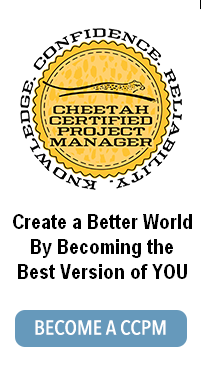Improve Mental Processing Abilities At Any Age
Sunday, February 1st, 2009by Michelle LaBrosse, PMP
I love working with younger people because their brains work so fast and are so nimble. My older brain sees patterns over years of seeing the same patterns – and the question I have is am I really seeing the patterns that exist, or am I seeing the patterns I think should exist because of years of neural network formation that is creating that observation? By hanging out with young people – like my sidekick Kristen on this blog, I get to experience seeing new patterns of the world through their younger brains and younger eyes. And I egotistically think they get the benefit of my wisdom garnered through more years of experience (this may or may not be true – my years of experience may also handicap me in some regards).
When I created Cheetah’s Accelerated Exam Prep system 9 years ago, I recognized that as we age, we can create new, enhanced abilities of mental processing, but it takes a focused and concentrated effort. I get reminded of this daily by hanging out with the young adults in my life. Here are some things you can do to improve your mental processing capabilities at any age:
1. Feed and Care for Your Mind – this means the foods AND the information you are ingesting. For foods, moderation is the key. Proteins and complex carbohydrates are the best. Sugar and caffeine are the worst. A little bit (very little bit) of caffeine can get the creative juices flowing, but the amount that most people consume these days will impact abilities of both short and long term retention. Your brain needs a little bit of sugar for optimal functioning – but the type of sugar is key. The sugars in complex carbohydrates and lower glycemic fruits and vegetables are the best. With information, variety is the key. If you get all your information from a few sources, you aren’t doing your brain any favors. Get your information from a wide variety of sources and teach your brain to grasp the bias inherent in whoever is creating and delivering the information. Become a detached observer of the information you are consuming. If you find yourself getting emotionally involved in what you are hearing, reading, or seeing, you are reinforcing neural networks that will keep you stuck in conditioned responses to information. You are literally creating physiological responses that over time become habits. These habits can impact your decision making abilities as you age. Remaining a non-reactive, detached observer that takes a more investigative view on what you’re reading, hearing and seeing keeps those neural networks forming and performing instead of storming and norming.
2. Stay Curious – look at the world with beginners eyes. Yes as you age, you may want to take the easy route and do things the way you have always done them. When you get stuck into this type of patterned response, you tend to get the results that you have always achieved. This works when the world keeps working the way it always has. But one of the fun things about life on this planet, is just when we think we have everything figured out, all the rules change. By staying curious, you get to try out new ways of reaching for your goals. The benefit of doing this is that as you age, you actually develop skills and capabilities that you didn’t have when you were younger. For example, if when you were younger math was a challenge, you might find it a lot easier to learn math when you’re older. This leads to our next tip….
3. Learn something new – like radically new. If you were very bookish when you were younger, work on learning new sports. The kinestetic kick will get your neural networks firing. And you might be amazed at your uptake time. If you struggled with math – try your hand at learning math. You might be pleasantly surprised how easy it is with an older, more world seasoned mind. Every year I work on learning a new type of technology, a new sport, a new game, a new skill that might have once even scared me.
4. Control your emotional states. Numerous studies are showing that even mild depression can accelerated mental decline. Excessive stress over time can lead to depression. You don’t need to run off to your doctor for the latest prescription in anti-depressant drugs (if you do have a serious medical condition by all means see your doctor). This is what you can do to stave off mild depression – daily exercise – at least 30 minutes of aerobic exercise every day can keep the blues at bay. If you find yourself getting down, get up and move. The more you move, the more you’ll be on your groove. Avoid alcohol, and refined sugar. Yes they might make you feel good for a short period of time immediately after you ingest them, but they will cause a longer term crash. Eat smaller more frequent meals of high protein, complex carbohydrates. And evaluate your life philosophy – yes we do all get to pick our life philosophy. The one that I like best is one that looks at all of life’s events as learning experiences that help me become better, stronger and happier. If you get into a tiff with someone, forgive yourself and them fast, make up and move on. When you carry the emotional weight of anger and grudges towards others or past events, it’s harder to interact in the present for what is really there and create a more uplifting future for yourself. The more you can control and choose your emotional states, the more power you have to increase your mental processing capabilities.
5. Give it a Rest – your brain needs time to rest and relax. I learned a technique last year called “purple breaks.” Joy Baldridge who’s dad started an accelerated reading company almost 50 years ago created this technique. When your eyes are in complete darkness they release some type of chemical into your brain that gives it time to unwind. What a purple break is, is a 10 to 20 minute break you take lying down with an eye mask covering your eyes. Just let it go – if you get an idea that comes into your mind, watch as it comes and goes. While relaxing, if you have a hard time letting ideas go, focus on your breathing for a short period of time. Sometimes when I’m incredibly amped up, I’ll listen to an audio program of binaural beats that push my brain into a more relaxed brain state (you can get these at www.bwgen.com). Also, take time to get the optimal amount of sleep for you – this will vary with the season and with your age. Be wary of folks who give you prescriptions for how many hours of sleep you need – get enough sleep for you – you know what this is.


